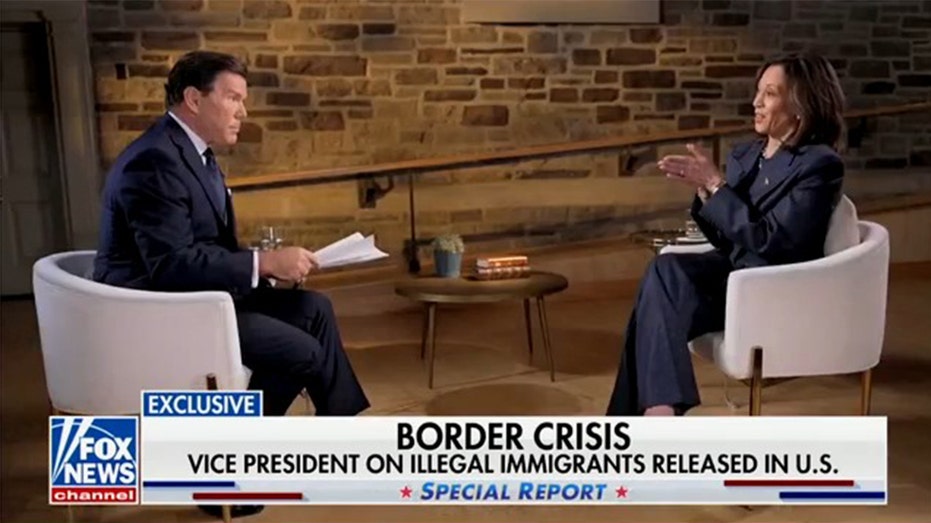What Vice President Harris left out about Biden admin's role in border crisis: A timeline
Vice President Kamala Harris faced a series of questions about her administration's handling of the crisis at the southern border – but she left out a lot.

Vice President Kamala Harris faced a series of questions from Fox News’ Bret Baier on Wednesday about the administration’s record on the border crisis – but did not mention a number of key decisions that critics say fueled the historic migrant crisis.
"The first bill that we offered Congress before we worked on infrastructure, before the Inflation Reduction Act, before the Chips and Science Act, before any, before the Bipartisan Safer Communities Act, the first bill, practically within hours of taking the oath, was a bill to fix our immigration system," Harris said in response to questioning on how the administration handled the border crisis.
But Harris skimmed over some of the details of that bill and also did not mention other actions taken by the administration at that time.
KAMALA HARRIS AVOIDS QUESTIONS ABOUT BIDEN'S MENTAL DECLINE: ‘JOE BIDEN IS NOT ON THE BALLOT’
After the Biden administration took office, it did, as Harris said, introduce a sweeping immigration reform bill. It would also grant farmworkers, along with Temporary Protected Status (TPS) and Deferred Action for Childhood Arrivals (DACA), immediate green card eligibility. They would then be eligible for citizenship three years later.
The bill would have also significantly increased the number of green cards and other immigration pathways available to foreign nationals. It would have also ended per-country caps and implemented a strategy to address "root causes" of migration.
Additionally, the administration announced the same day a 100-day moratorium on all deportations. It was eventually blocked by a federal judge after a lawsuit from Texas.
Biden also ordered a halt to all border wall construction, an abrupt move that resulted in piles of unused border wall materials littered throughout the border.
Separately, the administration also ended the "Remain-in-Mexico" policy, which had forced asylum seekers to remain in Mexico while their asylum cases were heard. Supporters had said that policy had effectively ended "catch-and-release" in the areas in which it was implemented.
Other orders included a directive to safeguard protections for DACA recipients, and a revocation of the Trump restrictions on travel from predominantly Muslim countries.
Encounters soon began to skyrocket at the southern border and President Biden took action by putting Harris in charge of tackling root causes. The administration said issues like climate change, poverty and violence were driving migrants north.
It quickly led to Harris being dubbed by media outlets and Republicans as the "border czar." The White House rejected that title, but it has stuck with her ever since and made her a figurehead, along with DHS Secretary Alejandro Mayorkas, for the crisis.
After the assignment by Biden, and with numbers skyrocketing through subsequent months to record highs, Harris immediately came under pressure to visit the border as the White House said her role was more diplomatic than related to the border directly. She instead went to Mexico and Guatemala and had a stern message for migrants that upset immigrant activists.
"Do not come. Do not come. The United States will continue to enforce our laws and secure our borders," she said. "If you come to our border, you will be turned back."
She would face pressure to go to the border itself, and eventually would visit the border in El Paso, Texas.
KAMALA HARRIS REPEATEDLY PIVOTS TO TRUMP WHEN GRILLED ON IMMIGRATION RECORD IN FOX NEWS INTERVIEW
After a lengthy court battle over first its deportation block, and then subsequent guidance that narrowed interior enforcement, the Biden administration announced its official rules for Immigration and Customs Enforcement (ICE) agents.
"The fact an individual is a removable noncitizen therefore should not alone be the basis of an enforcement action against them," the memo said.
It restricted agents to targeting recent border crossers, national security threats and public safety threats. That guidance coincided with a sharp drop in deportations and arrests. The administration would attribute that to COVID-era restrictions, but Republicans said it was part of a broader decrease in enforcement.
That month would also see a controversy over since-debunked claims migrants were whipped by Border Patrol agents on horseback in Texas. Harris helped fuel those claims.
"What I saw depicted about those individuals on horseback treating human beings the way they were was horrible," Harris told reporters. "And I fully support what is happening right now, which is a thorough investigation into exactly what is going on there. But human beings should never be treated that way. And I'm deeply troubled about it. And I'll also be talking to Secretary [Alejandro] Mayorkas about it today."
A subsequent investigation faulted the agents for minor infractions but found the underlying claims that migrants were whipped were not true.
Meanwhile, in the Senate, Democrats attempted to use the budget reconciliation to bypass the Republican filibuster and pass a pathway to citizenship for illegal immigrants.
Multiple plans were proposed, but were ruled inappropriate by the Senate parliamentarian. The measure was killed in October, when Sen. Joe Manchin, D-W.Va., said he was opposed to pushing an amnesty through in the process.
In 2022, the Biden administration sparked outrage by announcing that it intended to end Title 42 – a COVID-era order that allowed border officials to turn back migrants quickly at the border for public safety reasons.
The administration was blocked by a federal judge, and faced bipartisan backlash for the move, given that numbers were on the rise – with more than 2.3 million migrant encounters in FY 23, which was then a record.
The administration said it had a plan in place for the order, but that did not convince critics, including border Democrats.
The administration also faced legal challenges over its ICE rules for agents, and a tougher congressional makeup as Republicans took control of the House.
Meanwhile, Harris traveled to the Summit of the Americas in Los Angeles and met with other leaders on how to handle the crisis. During that summit, she announced that $3.2 billion in commitments from private sector companies had been secured. She also doubled down on the root causes explanation for the crisis.
Fiscal year 2023 broke the record for encounters with over 2.4 million. It was also the year in which the Biden administration finally lifted Title 42. It ended in May, with the administration surging resources to the border and announcing new consequences for illegal entry.
It combined those with a number of parole programs using the controversial CBP One app. Those programs allowed 30,000 migrants a month to fly directly in from four countries if pre-approved, and up to 1,450 migrants to come in across the southern border if they made an appointment at a port of entry and met certain conditions.
There was a sharp drop in numbers at the border in the immediate weeks after Title 42 ended, but they would move up again by the end of the year, hitting a record 250,000 in December.
In her interview with Baier, Harris mentioned the bipartisan border bill that was announced by lawmakers in January 2024. That bill, penned by lawmakers including Sen. James Lankford, R-Okla., would implement a restriction on entries when it reached certain levels.
It would also expedite work permits, tighten "credible fear" screenings and significantly increase funding and staffing for border agencies.
However, some liberals opposed it due to the emergency border authority, while some conservatives claimed it would codify high levels of illegal immigration. Former President Trump also opposed it. It was an issue that gave the administration, and Harris, a way to blame Trump for the alleged inaction on the crisis.
"I was just down at the border talking with border agents, and they will tell you… we need more judges. We need to process those cases faster. We need this support for those cases that should be prosecuted. They need more resources, and Congress, ultimately, is the only place that that's going to get fixed," Harris said on Wednesday.
"We worked on supporting what was a bipartisan effort, including some of the most conservative members of the United States Congress, to actually strengthen the border. That border bill would have put 1500 more border agents at the border, which is why I believe the Border Patrol agents supported the bill," she continued. "It would have allowed us to stem the flow of fentanyl coming into the United States, which is a scourge affecting people of every background, every geographic location in our country, killing people. It would have allowed us to put more resources into prosecuting transnational criminal organizations, which I have done as the former attorney general of a border state."
"Donald Trump learned about that bill and told them to kill it because he preferred to run on a problem instead of fixing a problem," she said.
With numbers still high at the border, Biden took action to limit entries into the U.S. The executive order suspended the entry of migrants across the border once it reached a certain level.
It was followed by a sharp drop in encounters by more than 50%. Administration officials said that was because of the Biden order, but stressed that Congress still needed to pass the bipartisan bill.
The issue of migrant crime would also be a major issue amid a number of high-profile crimes by illegal immigrants.
In February, Augusta University nursing student Laken Riley was beaten to death, allegedly by a Venezuelan illegal immigrant, while she was out for a jog on the University of Georgia campus. The suspect, Jose Ibarra, was encountered by the U.S. Border Patrol in September 2022 and released on parole into the U.S.
In July, two illegal immigrants were arrested on capital murder charges in the death of 12-year-old Jocelyn Nungaray in Houston, Texas. Jocelyn left her family's home to grab a late night soda when police say the men, Johan Jose Rangel Martinez and Franklin Jose Pena Ramos, led her out of a convenience store. The men are accused of luring her under a bridge, tying her up and killing her before throwing her body into a river. Officials confirmed they were in the country illegally and had arrived that year, but were released on orders of recognizance pending their immigration court hearings.
Harris, asked about those cases, said the following:
"Let me just say, first of all, those are tragic cases. There's no question about that. There's no question about that, and I can't imagine the pain that the families of those victims have experienced for a loss that should not have occurred. So that is true. It is also true that if a border security bill had actually been passed nine months ago, it would be nine months that we would have had more border agents at the border, more support for the folks who are working around the clock trying to hold it all together," she said.
Harris has criticized former President Trump for not supporting the bill and has promised to bring back the bill if elected to the White House, and sign it into law – while also calling for "comprehensive reform" that includes "strong border security and an earned pathway to citizenship."



